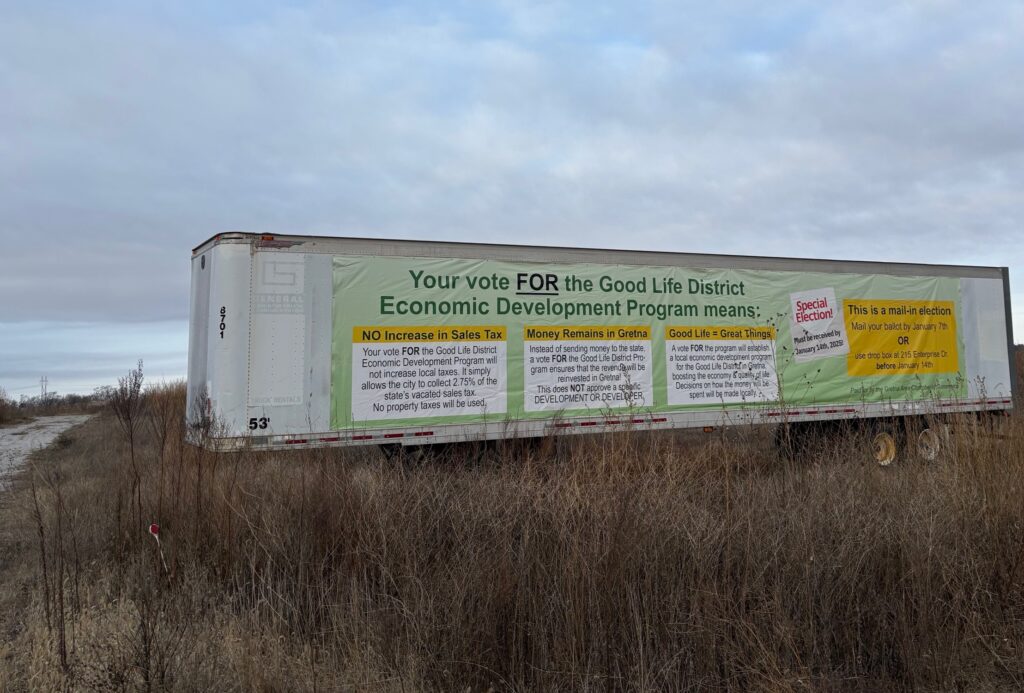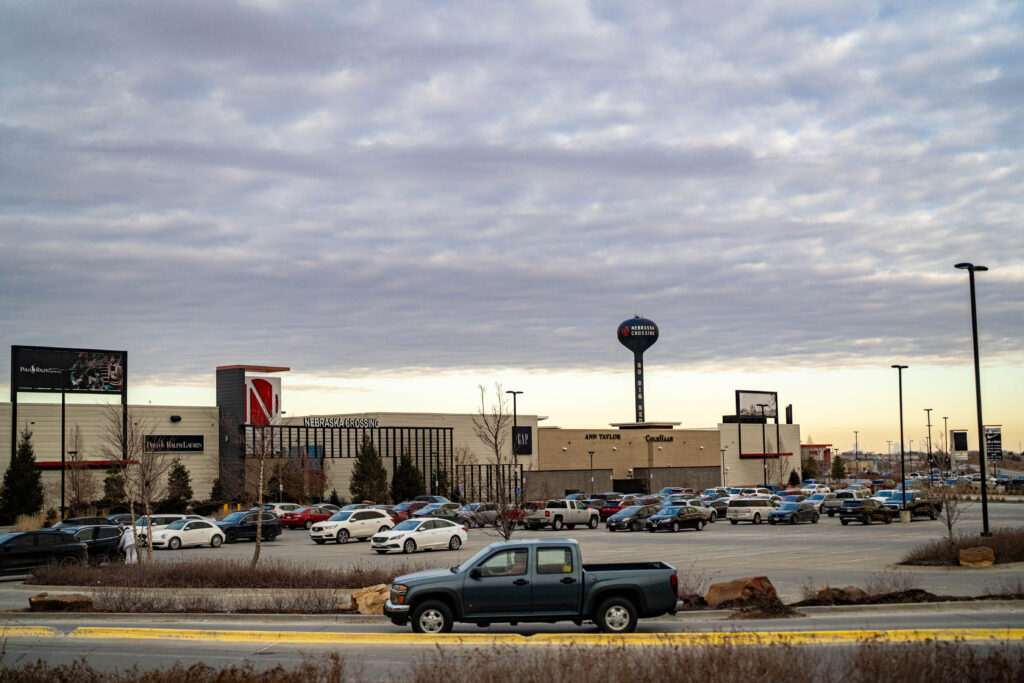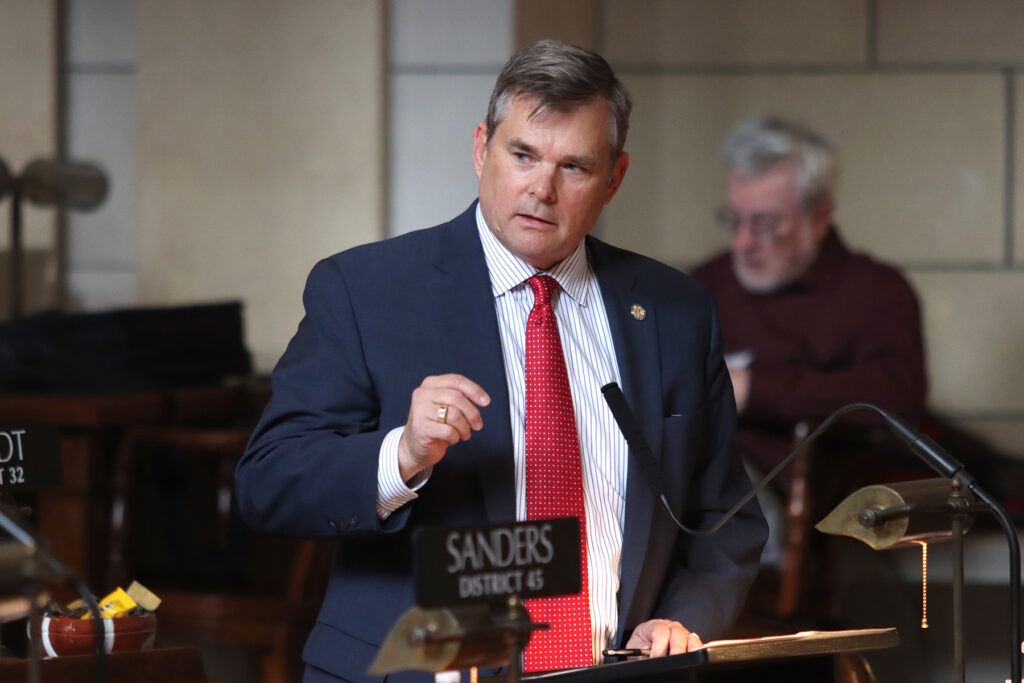State lawmakers hoped to inspire transformational development in areas like Nebraska Crossing with a 2023 law that resulted in a sales tax cut there and in other designated “good life” districts.
Now two years later that project in Gretna appears in limbo and the state is out more than $2 million in sales tax dollars as lawmakers face a projected budget shortfall.
That money went uncollected thanks to the evolving state law and a stalemate between developer Rod Yates and the City of Gretna.
“That absolutely was not what was intended to happen,” said Sen. Brad von Gillern, current chair of the Revenue Committee. “The fact that that money would just not go collected – that money should have been collected. There should have been a way to get that, to receive those funds and even just hold it.”
Yates, who owns Nebraska Crossing and backed the 2023 law, received one of the first good life designations in the state. Now he hopes to spur a law change that would let him bypass Gretna and work with the state instead.
“The Good Life Districts have such a negative connotation attached to them at the State leadership level we don’t want the association,” Yates said in an email.
The developer informed the state Department of Economic Development that “he believes the project is no longer viable” under the law and “will not be developed” as proposed, a department spokesperson confirmed Monday.
Yates said the city’s “vision” did not align with what he and former Sen. Lou Ann Linehan, who sponsored the legislation, had in mind.
Gretna previously rejected terms put forth by Yates, citing legal and financial risk, despite implied pressure from Gov. Jim Pillen to approve them. Pillen has received major political donations from Yates-associated companies.
Now that Yates is out, the state will decide whether the original good life district project is still viable without him, according to Department of Economic Development spokesperson Kate Ellingson.

Meantime, Gretna voters appeared to offer a signal of – albeit marginal – support for city control in a special election Tuesday. In unofficial results, they narrowly approved a city-run economic development program that could essentially start collecting the lost tax revenue and reinvest the money into the district.
Mayor Mike Evans said he thinks the close vote count signals that voters want to see a financially responsible project that reflects the community.
“We really need to make sure we hear that and do that,” he said. “We’re not in a rush to do this. We’re going to take our time, vet these projects regardless of who they are and make sure they’re good for our community.”
****
The district championed by Yates has been front-and-center since the “good life district” concept’s public debut.
He came to the Legislature in 2023 pitching big ideas for the area around the outlets: “new-to-market retail, entertainment and sports venues” that could draw over $1 billion in sales and 15 million visitors.
“We’ll become one of the top tourist destinations in Nebraska and a massive revenue generator for the state of Nebraska, for the city of Gretna in Sarpy County,” he said at a public hearing.
He had buy-in from key legislators like Linehan, who chaired the powerful Revenue Committee until she was term-limited this year.
“I know on a project that has this much potential, we have to find out a way to do it,” she said at the hearing.

Senators passed a law allowing for the creation of districts where the state would forfeit half of its sales tax – slashing it from 5.5% to 2.75%. That’s money that typically goes into its general fund to be spent on everything from state patrol to public schools.
The state OK’ed Yates’ application – touting a $3.2 billion estimated investment and almost 7,000 new jobs, according to Ellingson – in early 2024. It also approved applications from Omaha’s AvenueOne development and projects in Bellevue and Grand Island.
Meanwhile, Linehan came back with another bill that gave cities the opportunity to create economic development programs, in part to collect the lost sales tax money and use it to develop the district. But voters needed to approve.
“If you have a transformational project going on – yes the state sales tax was cut, but then there was no way to then recoup that money to be used towards the project,” said Korby Gilbertson, a lobbyist for the city of Gretna. “So, that is what precipitated the need for legislation in 2024.”
Gov. Jim Pillen signed it into law last April.

Now Linehan says her bill failed to achieve its goal of giving developers another tool, instead ensuring cities would control the money.
“I’m more than willing to take full blame that something went off the tracks,” she said.
But Mike Rogers, who helped write that bill in his capacity as the city of Gretna’s bond attorney, said city-controlled economic development programs were “a fundamental principle of the legislation from the start of its drafting.”
That’s because the 2024 bill was crafted to comply with the State Constitution, said Rogers. While public tax dollars generally can’t be used for privately owned things, he said, there’s an exception for voter-approved, city-run economic development programs.
****
In June, the Gretna City Council postponed its vote to schedule a special election on the economic development program question. The city did take other steps, creating an advisory committee and publicly posting a memo with guidance for interested developers.
In the time between the law’s passage and June, the sales tax cut resulted in almost $700,000 of forgone sales tax revenue within Gretna, according to the state Department of Revenue.
Then, in July, came an ultimatum of sorts: A term sheet Yates’ team sent to Gretna City Council members.
Expectations in the document include that the city annex 3,000 acres and designate it as “extremely blighted and substandard,” as well as drastically reduce its sales tax in the district. The city, Yates’ term sheet said, would be responsible for the cost of acquiring land at more than its appraised value plus 10%.
There was a lot of land to acquire: At a February bill hearing, Yates said he had control of only about 200 acres of the then-2,000-acre approved district.

Yates’ term sheet described a plan bigger and more detailed than what the developer had described to lawmakers in 2023. Its projected yearly retail sales would total $2 billion, according to the document. Nebraska Crossing, it reads, would “fund and build roads and infrastructure,” fund $7 million for a new public library and create a fund for the council to use.
Among elements of the proposed development: Olympic training facilities, PGA tournament championship golf, retail, hotels, resorts, luxury residential and “green” living, medical tourism, private jet service and a youth sports academy.
In an email, obtained by the Flatwater Free Press via public records request, Gov. Pillen appears as an advocate for the terms’ swift approval.
“Please note that the Governor would like this executed by The City of Gretna Council Members on or before July 31, 2024, as stated in the executed term sheet,” reads the July 27 email from Johanna Boston, who works with Yates.
Yates appears to be a major donor to Pillen’s gubernatorial campaign committee. A company that lists Yates as its manager gave at least a combined $355,000 to Pillen and a Pillen-associated political action committee between late 2021 and 2024, according to campaign finance records. Nebraska Crossing gave $77,000 in-kind in food, beverages, advertising, events and venues.
The governor’s office did not respond to a question Tuesday about whether this influenced Pillen’s advocacy for the project.
According to that email, the document – signed by Pillen, Department of Economic Development Director K.C. Belitz and Yates – was also reviewed and approved by Attorney General Mike Hilgers.
In November Gretna city officials noted that other developers, unlike Yates, had followed the process laid out in its public memo to submit incentive requests in the district. Yates’ representatives, according to the city, said the term sheet was final – Yates wasn’t open to negotiating.

The city’s municipal adviser, underwriter, and bond attorney advised the city not sign the term sheet because it presented legal and financial risks, according to city documents.
Its expectation that the city acquire land if owners refuse to sell within 10% above appraised value implied the use of eminent domain, bond attorney Rogers wrote, which the city doesn’t have the authority to do for development like this.
There were no details about how the city could deliver services to the annexed area, he wrote, and no study to support a determination that it’s “extremely blighted.” Plus, the city’s sales tax money is already pledged for bond payment – reducing it would violate agreements with bondholders.
And, referencing in part a demand that Yates would determine if occupation taxes would increase, Rogers wrote: “The City does not have statutory authority to delegate such determinations regarding levels of taxation and use of tax revenues to a private party.”
The city declined Yates’ terms.
“We never said no to the vision,” said Evans, the Gretna mayor, “We just said these terms are not acceptable because we have constitutional concerns, we have financial concerns.”
****
Between April and November 2024, more than $2.2 million in sales tax revenue was not collected in Gretna that – without the good life designation – would’ve gone to state coffers, according to the state Department of Revenue.
Even if the issue would’ve gone to a vote faster, that time lag is inherent in the law.
The legislations’ advocates acknowledge that something went wrong in allowing for the gap in time when that revenue disappeared – especially at a time when the Legislature is facing a projected budget shortfall of $433 million. And Pillen continues to advocate for more tax relief.
Linehan said that the missing money isn’t good, but said forecasts are often significantly off. And in the context of the state’s multi-billion-dollar budget, it’s “budget dust.”
“It’s not good, but with a $5.5 billion budget, it’s not much,” she said.

Sen. von Gillern said he plans to bring legislation this year related to good life districts. He’s not carrying any new legislation for Yates, he said, but looking at tweaking the law to make the sales tax cut “work as originally intended” – as “seed money for growing a greater return at a later date.”
Pillen’s spokesperson, Laura Strimple, said the governor was hopeful that the program would “create game-changing economic development projects” across the state.
“He has been disappointed that the (Good Life Transformation Projects Act) is not making progress towards this potential,” Strimple wrote in an email. “The Governor looks forward to partnering with the Legislature to address the GLTPA’s problems this session.”
Yates has high hopes for another route, saying in an email that, “We will create new legislation that accomplishes the goals of the state leadership and the global users we are bringing into the Nebraska Mega project.”
In Gretna, Evans said the City Council will move quickly to create the voter-approved economic development program.
He said “it’s so important we start collecting the state’s revenue.” And the city is confident it can prove the district is still a go without Yates.
“We’ve always felt that the legislators, what they intended was to create these transformative districts and all this opportunity for not only Gretna but for the whole region and the state,” Evans said. “It was never given to a person, it was given to an area and a district. If people within that district and developers can still accommodate that, then why wouldn’t you support them?”







6 Comments
Great journalism. Thank you.
It seels like this is another example of certain state senators, (Linehan, for one, is famous for this, eg school choice) and Governor Pillen putting the demands of millionaires ahead of the taxpayers. Voters of NE need to do some actual thinking before they vote against their own interests.
This is by far the most comprehensive and best explanation I’ve read of this many-tentacled saga. Thank you.
Please look into the Good Life District in Grand Island. During the rush to get GLD voter approval, no one mentioned that the vote was an end-run of the state’s constitution. In addition, look at the definition of ‘transformational’ and whether or not simply adding more retail and more housing, meets that definition.
Laws that allow the use of taxpayer funds to profit private companies, need to be outlawed.
If it is such a wonderful idea, why does government need to fund it!?!
I know, corruption!
Without the millionaires and billionaires in Omaha, (just one of those?) There would be no Omaha, no UNMC no Lincoln. To name just a few.
I can’t figure out why, when a person works their way up the financial ladder, that is such a bad thing. Valentine use to have the highest number of millionaires per capita in the nation because of farming and ranching. Did we despise that whole city? Just like the “poor” folks. There are good and bad ones. I’m grateful we have so many good rich ones with lots of money to share.